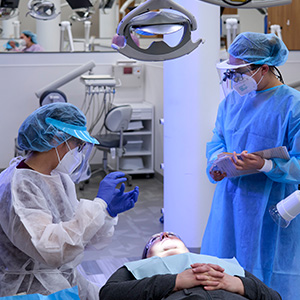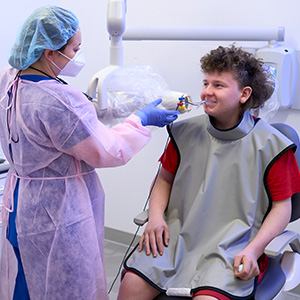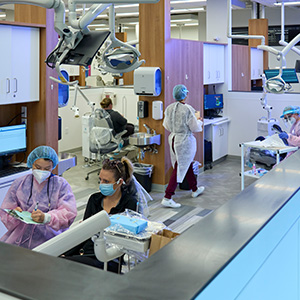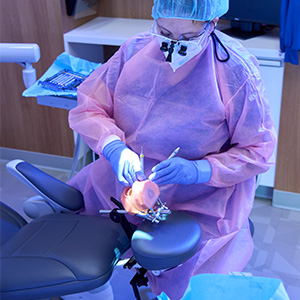Hands-On Experience in Dental Hygiene Health Care
The dental hygiene associate in applied science (AAS) program is a two-year, full-time program that begins each fall and is designed to prepare students for licensure and employment in the state of Missouri. The program includes a general education component as well as a concentration in dental hygiene. Graduates of this program may transfer to a four-year college or university to obtain a bachelor of science degree. Acceptance of credits earned is at the discretion of the receiving institution. Access the Dental Hygiene Program Information Sheet here.
Graduates of this program are eligible to sit for the National Board Dental Hygiene Exam, regional clinical exams, Missouri State Board Jurisprudence exam and are eligible for admission to the Missouri Dental Hygienists’ Association and the American Dental Hygienists’ Association.
This program has special admission requirements. Please review the requirements checklist before submitting your application.
What is Dental Hygiene at St. Louis Community College?
Through classroom work, laboratory and clinical experience in the on-campus public dental hygiene clinic, students learn to conduct patient assessments, assess medical and dental histories, perform diagnostic tests and examinations, instruct patients in preventive dental health practices, perform various dental procedures, and design and implement community and school health programs.
Students should be interested in biology and health sciences and possess good hand/eye coordination. Exceptional communication skills and attention to detail are necessary. If you are seeking a profession that provides oral health care services, and you enjoy working with a diverse population in a clinical setting, then this may be the career path for you.
"The STLCC dental hygiene program is accredited and affordable, and the instructors prepare us well—it has a very high pass rate for the national boards... They helped set us up for success by hosting a dental hygiene career fair to find jobs before graduation. The program also had mandatory offsite rotations and an on-campus clinic. When preparing for clinical/national boards, we were given multiple practice exams to build our confidence and readiness." - Lauren Aten, graduate

What Can You Do with a Dental Hygiene Associate Degree?
The role of a dental hygienist combines the best of many dental health care services. As a licensed oral health care professional and member of a dental team, a dental hygienist delivers a wide range of services under the general supervision of a dentist.
Dental Hygiene Program Goals
- The program will provide career education to prepare entry level dental hygienists. The students will possess the knowledge, skills and values needed to successfully matriculate through the program, pass their credentialling exams, obtain licensure, and begin the practice of dental hygiene.
- The program will facilitate dental hygiene community members in meeting the goal of life-long learning, professionalism, and community service.
- The program will provide the community with excellent dental hygiene patient-centered care.
- The program will engage the dental community through advisory committee meetings, student enrichment activities/service learning and interprofessional collaborations.
- The program will further explore innovative delivery of its curriculum through online and academic supportive education modalities.
AAS in Dental Hygiene
- Degree offered: Associate in Applied Science
- Locations: Forest Park
- Hours to complete: 73
- Program contact name: Maggie Malench
- Program contact email: stlcc-dentalhygiene@stlcc.edu
- Accreditation:
The program in dental hygiene is accredited by the Commission on Dental Accreditation [and has been granted the accreditation status of "approval without reporting requirements"]. The Commission is a specialized accrediting body recognized by the United States Department of Education. The Commission on Dental Accreditation can be contacted at 1-312-440-4653 or at 211 East Chicago Avenue, Chicago, IL 60611. The Commission’s web address is: ada.org/coda - This program meets the educational requirements for state licensure in the following states: Missouri, Illinois, Alaska and South Dakota. Students interested in pursuing licensure in a different state should contact the program coordinator for more information.
- Please note:
Dental professionals may be at risk for exposure to numerous workplace hazards. These hazards include but are not limited to the spectrum of blood borne pathogens, infectious diseases, pharmaceuticals and other chemical agents, human factors, ergonomic hazards, noise, vibration and workplace violence. Read more about this risk.
Cost of Attendance
Note: All costs listed are estimates and may vary.
Prior to starting the program:
- Background check and Compliance Tracker - $100
- CPR Certification (AHA Basic Life Support) - $ 75
First Year; Fall Semester: ($6,664)
- Scrubs, shoes and socks - $400
- First semester instrument, equipment and supply kits A, B, C and D - $2,000
- Books - $1,000
- Loupes with headlamp - $1,400
- In-district tuition fall and spring semester for a total of 16 credits - $1,864
First Year; Spring Semester: ($4,429)
- Second semester instrument, equipment and supply kits E, F and G - $1,800
- Replaceable supplies - $200
- Books - $500
- In-district tuition fall and spring semester for a total of 16 credits - $1,864
- Mandatory American Dental Hygiene Association student membership - $65
- Membership can be purchased for one or two years at registration. Fees may vary if students opt for the two-year registration. Membership must be maintained while in the program.
Second Year: ($7,103)
- Advanced Instrumentation Kit and disposable supplies - $1,000
- Books - $400
- In-district tuition, summer, fall and spring semesters for total a of 26 credits - $3,728
- Mandatory American Dental Hygiene Association student membership - $65
- Membership can be purchased for one or two years at registration. Fees may vary if students opt for the two-year registration. Membership must be maintained while in the program.
- Spring semester second year has degree culmination and testing expenses.
- They are approximately as follows:
- Pin purchase - $50
- National Boards Dental Hygiene Exam application fee - $600
- CRDTS application fee (clinical boards) - $1,150
- Missouri Dental Board Jurisprudence Exam and License application exam fee - $100
- Fees may vary by state.
- Transcript fee per request (needed for licensure) - $10
TOTAL = $18,196
(Please note that the tuition calculation above is based on in-district rate of $122 per credit hour. Out-of-district tuition is $171 per credit hour, out-of-state tuition is $223 per credit hour, and international is $243 per credit hour. All fees are subject to change.)
Program Outcomes
| Graduation Class | Pass rate for National Boards | Pass rate for Clinical Boards | Licensure Attained |
| Class of 2015 33 Grads |
100% |
100% |
100% |
| Class of 2016 30 Grads |
96.6% |
100% |
96.6% |
| Class of 2017 24 Grads |
95.8% |
100% |
95.8% |
| Class of 2018 29 Grads |
100% |
100% |
100% |
| Class of 2019 27 Grads |
100% |
100% |
100% |
| Class of 2020 27 Grads |
100% |
100% |
100% |
| Class of 2021 25 Grads |
100% |
100% |
100% |
| Class of 2022 14 Grads |
100% |
100% |
100% |
| Class of 2023 26 Grads |
100% |
100% |
100% |
| Class of 2024 31 Grads |
100% |
100% |
100% |
Requirements and Prerequisites
In order to be admitted into the program, you must meet all of the program requirements. Official transcripts from high school, GED certification, and all other colleges must be mailed to the Registrar’s office (hand-carried and faxed transcripts are not accepted). Upon acceptance to STLCC, students will need to specifically apply to the dental hygiene program. It is highly recommended that students meet with an STLCC dental hygiene program academic advisor to complete an academic plan prior to applying for the program.
- Acceptance into the dental hygiene program has three requirements:
- Cumulative GPA: Students must maintain regular student status and a cumulative 2.5 GPA.
- Science Prerequisite GPA: Four science prerequisite courses must be completed prior to filling out the dental hygiene program application. A minimum of a 3.0 GPA is required for these four science courses: Microbiology (BIO 203); Anatomy & Physiology I (BIO 207); Anatomy & Physiology II (BIO 208); and Fundamentals of Chemistry (CHM 101) with a minimum grade of C or better in each course within five years prior to admission. Science prerequisite courses may be retaken one time for a maximum total of two attempts.
- Observation Hours: Students must complete a total of 20 hours observing dental hygienists in private practice in a minimum of two offices, three preferred. This is to be documented on practice letterhead (date, number of hours spent observing and signature of dentist or dental hygienist). Professional attire is required, no jeans and closed-toe shoes only.
- Program Notification of Acceptance: Offers are sent based on application date, time, and campus preference. We send waitlist updates at the end of each fall and spring semester to ensure students have the most up-to-date information. All communication will be sent to STLCC student email addresses only. It is the responsibility of the student to maintain access to their STLCC student account.
- Additional clinical compliance items and uniform requirements are discussed during orientation. Becoming clinically compliant is not a pre-entry requirement but will be important once students are formally admitted to an incoming cohort.
- Graduates of the dental hygiene program are eligible to sit for the clinical and national board exams as well as apply for state licensure. Licensure applications include questions regarding criminal history, drug addictions and require a Social Security number. Discovery of relevant criminal history or false information may result in denial of the student’s application, conditioned licensure or the filing of disciplinary action against the applicant.
Why You Should Choose STLCC’s Dental Hygiene Program

Our Faculty and Staff
Faculty members include registered dental hygienists and dentists licensed in Missouri as well as others with expertise in particular specialties.

Hands on Learning
The dental hygiene program uses a three-pronged approach to education. The teaching environment covers classroom work, laboratory experience and actual clinical practice. Students in this program receive real life hands-on experience at the public dental hygiene clinic at the Forest Park campus.

Advanced Facilities
STLCC has a fully equipped, 30-chair, dental hygiene clinic with four x-ray rooms equipped with four intraoral x-ray units and one panoramic unit, all which utilize digital radiography.

Opportunities in the Field
Employment of dental hygienists is expected to grow by 20 percent from 2016 to 2026, much faster than the average for all occupations. Graduates are qualified for positions as dental hygienists.
STLCC. What's your reason?